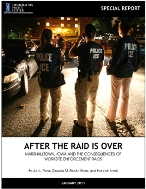 By Jan Flora, Claudia M. Prado‐Meza, and Hannah Lewis
By Jan Flora, Claudia M. Prado‐Meza, and Hannah Lewis
For many years, large-scale worksite raids constituted a major element of federal immigration enforcement. While the large-scale and well-publicized worksite raids have tapered, immigration enforcement has continued to increase, and the number of deportations and detentions is at an all-time high.
The ever-expanding arsenal of ICE enforcement policies, together with harsh state and local laws and policies, have harmful side effects that go far beyond the unauthorized population. Policies meant to target unauthorized immigrants also impact their family members, employers, and neighbors. A large number of the people affected are U.S.-citizen children. Latinos, Asians, and others who “sound” or “appear” to be foreign may be the victims of mistakes (such as the U.S. citizens who have been mistakenly deported), or may experience civil rights violations, discrimination, or profiling. In states and localities with anti-immigrant laws and policies, negative attitudes towards immigrants and nasty rhetoric might be enough to cause lawfully present people to leave. Read more...
Published On: Tue, Jan 25, 2011 | Download File




